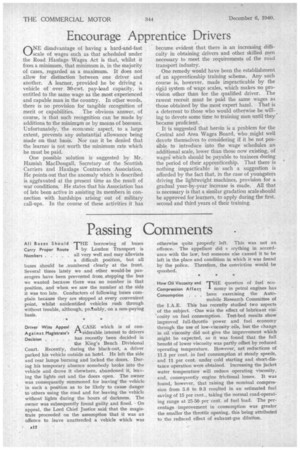Passing Comments
Page 14

If you've noticed an error in this article please click here to report it so we can fix it.
All Buses Should THE borrowing of buses Carry Proper Route I by London Transport is
Numbers all very well and may alleviate
a difficult position, but all buses should be .numbered clearly at the front. Several times lately, we and other would-be passengers have been prevented from stopping the bus we wanted because there was no number in that position, and when we saw the number at the side it was too late. Conductors of following buses complain because they are stopped at every convenient point, whilst unidentified vehicles rush through without trouble, although, prughably, on a non-paying basis.
Driver Wins Appeal A CASE which is of con Ag a i nst Magistrate's siderable interest to drivers
Decision has recently been decided in the King's Bench Divisional Court. Recently, during the black-out, a driver parked his vehicle outside an hotel. He left the side and rear lamps burning and locked the doors. During his temporary absence somebody broke into the vehicle and drove it elsewhere, abandoned it, leaving the lights out and the doors open. The owner was consequently summoned for leaving the vehicle in such a position as to be likely to cause danger to others using the road and for leaving the vehicle without lights during the hours of darkness. The owner was subsequently found guilty and fined. On appeal, the Lord Chief Justice said that the magistrate proceeded on the assumption that it was an offence to leave unattended a vehicle which was otherwise quite properly left. This was not an offence. The appellant did e t;rything in accordance with the law, but someone else caused it to be left in the place and condition in which it was found by the police. Therefore, the conviction would be quashed.
How Oil Viscosity and HE question of fuel eco
Compression Affect nomy in petrol engines has
Consumption . . . been exercising the Auto
mobile Research Committee of the I.A.E. This has recently studied two aspects of the subject. -One was the effect of lubricant viscosity on fuel consumption. Test-bed results show improved full-throttle power and fuel economy through the use of low-viscosity oils, but the change in oil viscosity did not give the improvement which might be expected, as it was found that the full benefit of lower viscosity was partly offset by reduced operating temperature. However, net reductions of 11.3 per cent. in fuel consumption at steady speeds, and 11 per cent, under cold starting and short-distance operation were obtained. Increasing the jacket water temperature will reduce operating viscosity, and, consequently engine frictional losses. It was found, however, that raising the nominal compression from 5.6 to 9.3 resulted in an estimated fuel saving of 15 per cent., taking the normal road-operating range at 25-50 per cent, of fuel load. The percentage improvement in consumption was greater the smaller the throttle opening, this being attributed to the reduced effect of exhaust-gas dilution.




















































